What is FSC?.svg/855px-Forest_Stewardship_Council_(logo).svg.png)
The name Forest Stewardship Council®, the initials FSC® and the FSC tick-tree logo are all registered trademarks and may not be used without prior authorisation. The FSC are an international non-profit organisation who are dedicated to promoting responsible forestry. The FSC organisation certifies forests all over the world to ensure they meet the highest environmental and social standards. Products made with wood and paper from FSC forests are marked with the ‘tick tree’ logo.
When you see this logo, you can be confident that FSC products won’t mean harming the world’s forests.The FSC go around and inspect forests. They are then certified by strict standards which can be found on their website here; https://www.fsc-uk.org/en-uk/about-fsc/what-is-fsc/fsc-principles . All forests that meet their standards will receive an FSC certificate which they will then be able to use this on their labels.
- Taking care of forests – FSC helps take care of forests and the people and wildlife who call them home and is recognised by WWF as the “hallmark of responsible forest management”.
- Recognised throughout the UK – 50% of people in the UK recognise the FSC® logo (GfK 2014) and the market for responsibly sourced timber and timber products is growing.
- IMPACT IS FAR-REACHING – The FSC operate in over 100 markets and issue more certificates globally than any other timber certification scheme.
Why choose the FSC®
Bar-Be-Quick were the first UK charcoal supplier to obtain FSC® certification for its charcoal products and recently became the first global supplier of Fairly Traded Charcoal.
The FSC helps take care of forests and the people and wildlife who call them home and is recognised by WWF as the “hallmark of responsible forest management”.
When you see the FSC® logo
We use the FSC®’s “tick tree” logo on our barbecue charcoal products to indicate that they are certified under the FSC® system.
When you see the FSC® logo on a label, you can buy forest products with confidence that you are helping to ensure our forests are alive for generations to come.
Our Charcoal Lumpwood Story
The Region
Over 90% of the Namibian population derives income from dry-land commercial cattle farming
Bush encroachment from invader bush, has infringed on about 26 million hectares of prime agricultural land and 2004 estimates suggest that it costs the Namibian economy more than N$1 billion per annum (£66m) in lost beef production. The problem of bush thickening and its negative impact on the productivity of farmland is widely recognised as a major issue within the agricultural industry.
The utilisation of the ‘problem’ species for the manufacture of charcoal has been studied and accepted as an environmentally friendly process which improves rangelands and allows farmers to reclaim grazing land and the harvested wood to be turned into charcoal
Shrub-encroached areas often suffer from reduced ground-water recharge which in turn affects plant and animal diversity.
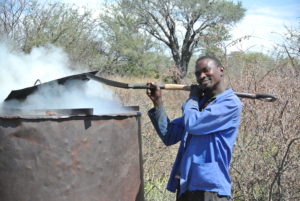
The Production Process
The basic method of producing charcoal is simple and has remained relatively unchanged over the centuries. Invader bushes (that encroach the Namibian landscape causing economic, social and environmental difficulties) are harvested by our farmers. This is loaded into a kiln and carbonised over a 3 day period. Our farmers are skilled in loading the kiln at the highest efficiency. It is not an exact science and can depend upon the timber type, weather and area of grassland. Once the burn is complete and the kiln cooled, the charcoal is collected and sent to our factory where it is graded, bagged accordingly and shipped over to the UK. It is then converted into a finished product
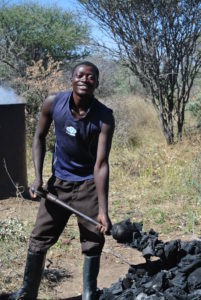
Our Workers
Our burners, the ones who harvest the charcoal, are mainly migrant burners who return year after year to Namibia, living in the bush between March – September. They travel around vast tracts of untended farmland using iron kilns to turn FSC wood into charcoal. Their housing, through choice, is very basis but by teaming up with Tradecraft, Rectella have been able to build and provide permanent shelters.
Johnny (pictured below) left Rwanda in 1995 [the year after the genocide] and made his way to Namibia where he has refugee status. He lives on the camp with his girlfriend of three years and their fourteen month old baby daughter. They have had the new metal house since the baby was born and Johnny has been working on the farm for three years.
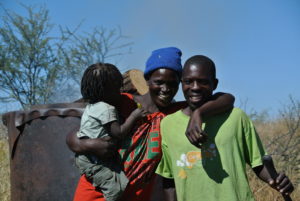
“This house is better, it is warm in the winter. The cold cannot enter. It is important for families with wives and children”
Additional funding through fairly traded schemes has allowed investment into the communities who live in and around our factory. 300 bikes have been purchased for the workers to enhance the safety and ease of their journey from the local township. Investment also allows bikes to be mended and bicycle lessons to be offered to those who cannot ride.
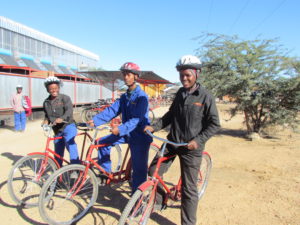
A school with classroom, teacher and computers has been provided for the children of our factory workers. The classroom is also used as a training centre and kindergarten room. “We love writing and drawing and reading in our classroom. We learn to do maths and read stories. Without our classroom we would have nowhere to do our homework. Our teacher also taught us how to knit!”
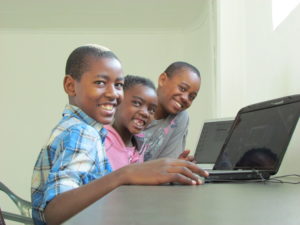
What the future holds
There is hope and persistence to invest in additional land, where retirement housing can be built. Bricks can be manufactured at our charcoal production site and reassures for our business that employees can be looked after once they are no longer in a position to work (at retirement age). Vegetable gardens are also being put in place, this is to ensure sustainability and self-management of crops and will use grey water from the factory shower.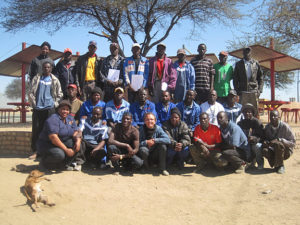
For more information regarding the FSC, please visit their website: https://www.fsc-uk.org/en-uk
